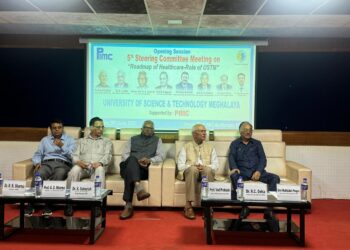Bhopal, June 3, 2022: A new movement ‘Baatein Unlocked’ was launched today to improve youth access, increase youth participation, and strengthen youth collective action to demand and access family planning and reproductive health information and services that respond to their needs. Launched by the U.S Agency for International Development (USAID) and Jhpiego, using multimedia tools and digital platforms, the movement will work in the states of Madhya Pradesh, Odisha, and Jharkhand, to promote youth participation by creating platforms for vulnerable and disadvantaged youth — those who are often left behind — to fully participate in decision-making as a key partner and lead healthy, productive, and engaged lives.
Commending the initiative, Ms Priyanka Das , Mission Director, National Health Mission, Madhya Pradesh said, “I would like to congratulate USAID for initiating a youth-led movement to improve young people’s knowledge, attitude, practices and service utilization by increasing their agency to demand and access healthcare solutions that enable them to make positive FP/RH choices.”
Sharing the purpose of the program, Sakshi Patel, lead Facilitator of Sambhavna Fellowship, Had Anhad and founder of ‘Express Yourself Community’ where young people connect with each other and discussion social issues, said, “There are many issues around sexual and reproductive health, that young people feel awkward talking about. As a result, there are many misconceptions and myths that derive from shyness, lack of resources and limited awareness. Young people are not engaging with each other, and they often do not have safe and confidential spaces to discuss these critical issues. As young people Baatein Unlocked provides us with that platform where we can come together to overcome our taboos and prejudices together.”
Speaking at the launch, Sangita Patel, USAID/India Health Office Director, said, “Young people drive positive change in their families, communities, and nations. Instead of viewing youth as passive recipients, young people should be viewed as agents of their own development. Last month, USAID updated its Youth in Development Policy with a vision of a world in which young people have agency, rights, influence, and opportunities to pursue their life goals, and contribute to the development of their communities. We are happy to support `Baatein Unlocked’ in India as it forges a more inclusive, sustainable, and resilient future for the youth in India.”
Elaborating on the program, Dr. Somesh Kumar, Country Director, Jhpiego India, an international, non-profit health organization affiliated with The Johns Hopkins University, said, “The MOMENTUM Country and Global Leadership: India-Yash project recognizes the importance of strong, multi-sectoral collaboration to respond to young people’s unmet family planning and reproductive health needs, particularly vulnerable youth populations. Baatein Unlocked, the youth-led movement, will support young people to reach their full potential, lead healthy, productive lives, and provide an enabling environment for adolescent and youth-friendly health services”.
Implemented under USAID’s MOMENTUM Country and Global Leadership: India-Yash program, the ‘Baatein Unlocked’ will work with Purpose, a social movement incubator based in New Delhi, to bring together youth-centric organizations, civil society organizations, traditional and non-traditional media, digital platforms, youth groups, and influencers to accelerate improvement in young people’s health outcomes in the country.
Global progress towards universal access to sexual and reproductive healthcare services will only be achieved with meaningful participation of the 1.8 billion young people in the world; 90 percent of whom come from low – and middle-income countries. In India, young people aged 15-29 years make up more than 27.5 percent of India’s population and, according to the National Youth Policy, contribute about 34 percent of India’s gross national income. Most importantly, young people represent a critical break in the cycle: when young people are educated and influenced positively, they are able to set in motion a virtuous cycle that sustains itself for generations to come.








